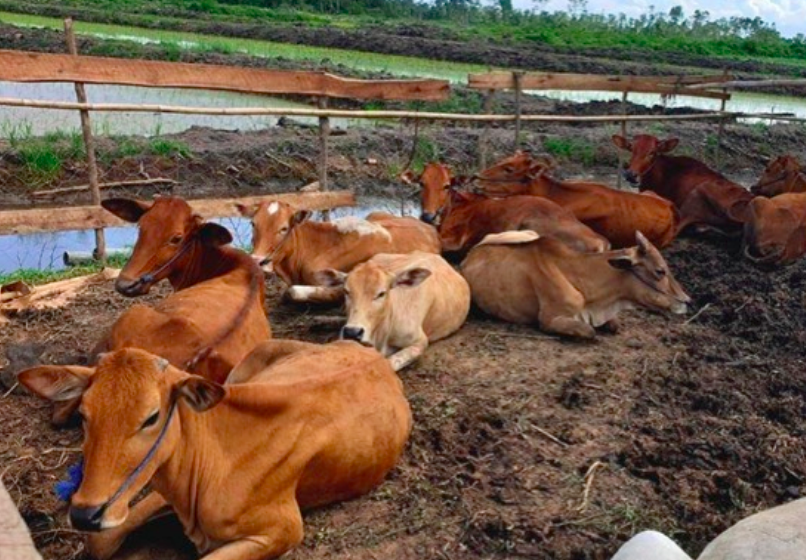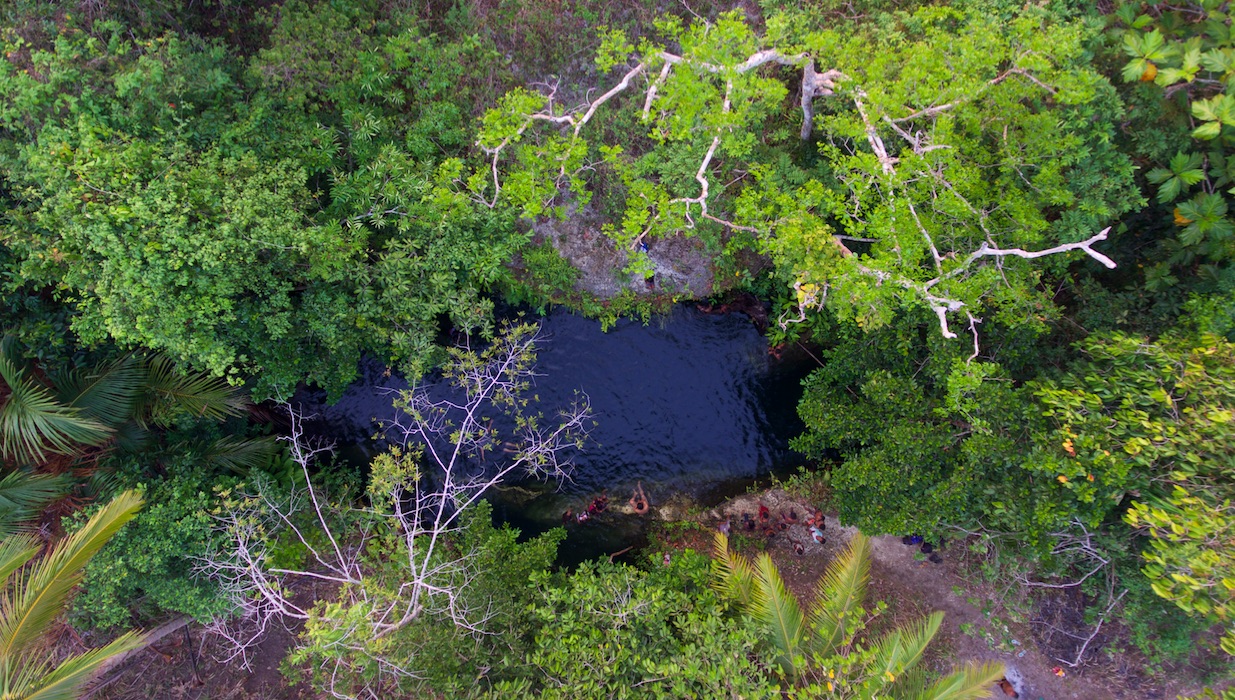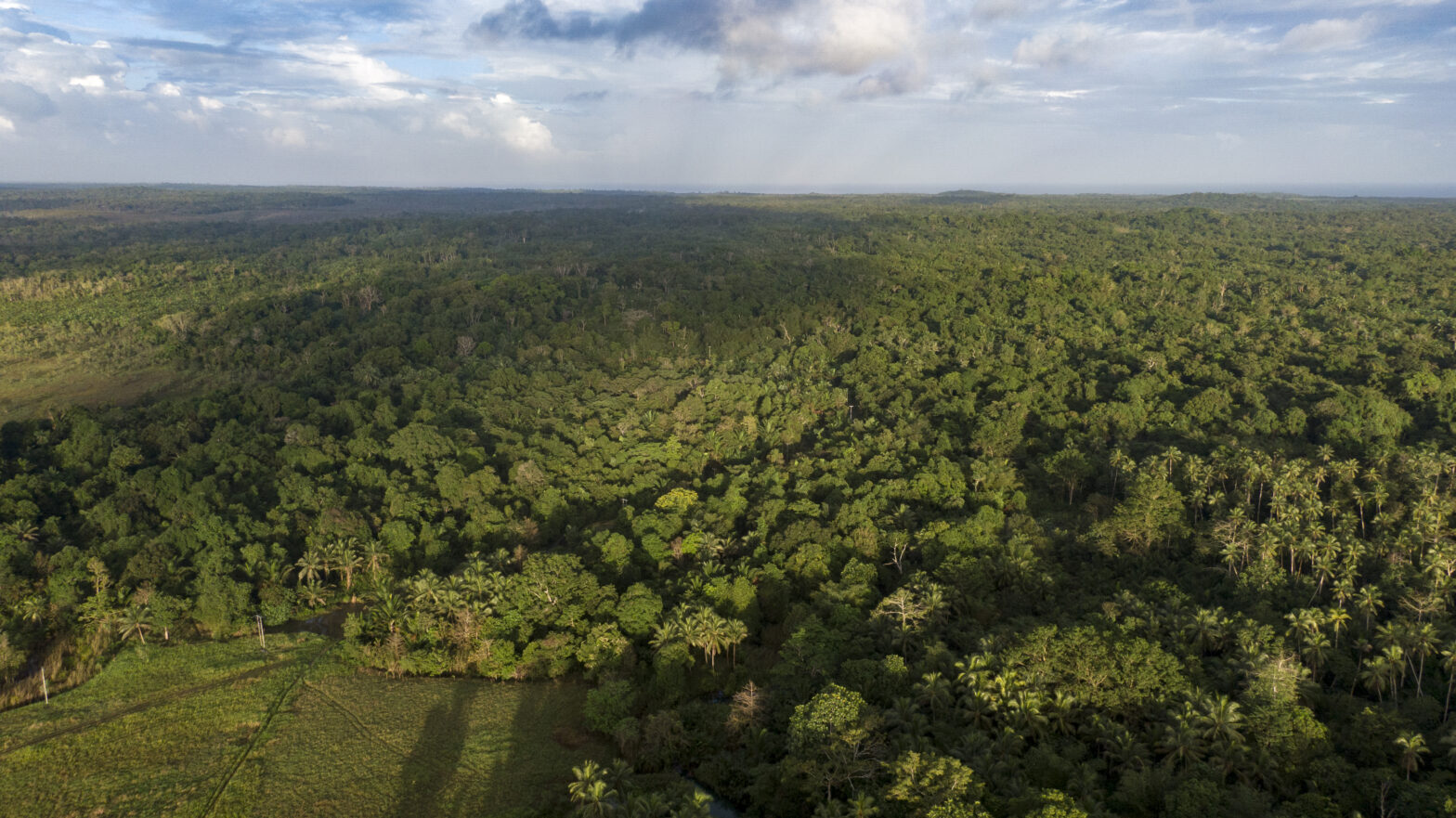Four cattle-ranching firms have acquired permits for an area covering almost 62,000 hectares on Trangan Island, one of the most pristine of the Aru Archipelago. Mongabay Indonesia explores how this came to be.
The Popjetur Elementary School was abnormally crowded on that day in October 2017, but not by students like one might expect; by officials and the public. They were all there for a face-to-face meeting related to the planned entry of cattle ranching investment.
The officials present included Amran Sulaiman, Minister of Agriculture; Johan Gonga, Regent of Aru Regency; Zeth Sahuburua, Deputy Governor of Maluku; Maluku police chief and businessman, Andi Syamsuddin Arsyad otherwise known as “Haji Isam.”
On the walls of the school, there are banners for face-to-face events between the Minister of Agriculture and the village government and farming communities throughout the South Aru District.
Yosias Siarukin, a resident of Popjetur, was curious to see the meeting and tried to approach. Yosias once fought against the entry of sugar cane plantations, PT Menara Group in his area, so he was always wary when he saw official meetings in the village.
Sure enough, the meeting turned out to be a promotional event concerning ranching.
“I saw that in the group there was a big businessman named Haji Isam. Haji Isam introduced himself as a farm manager,” said Yosias, last June.
Yosias said the meetings didn’t involve all the Indigenous stakeholders, many of whom should have been represented.
“Ladies and gentlemen, hopefully next year (2018) we will send cows here, in this place, our sub-district head will send at least 200 large cows here,” said the agricultural minister in a video clip of the meeting Mongabay Indonesia received.
After Amran’s visit in 2017, officials from the Ministry of Agriculture then visited Aru during the same year with 10 cows, which were immediately taken to the Animal Husbandry Center, about two kilometers from a residential area.
The Government of the Aru Islands Government responded to the visit of the Minister of Agriculture’s group in May 2018 by holding a public comment meeting on the cattle husbandry investment plan, attended by representatives of four companies that planned to start cattle ranching
In July 2018, two groups of companies, accompanied by the Maluku Agriculture Office, arrived for further meetings and community dialogue
“In their meetings, they promised 2,000 cows to help us,” Yosias said, but since then, the community has never heard of further investment. Meanwhile, the cows at the center died one by one.
The 2017 national beef outlook data shows that the per capita consumption of beef for the Indonesian people in 2017-2021 has grown by an average of 6.30% per year.
The projection of the Ministry of Agriculture is that national beef consumption in the next five years in aggregate will grow by an average of 7.55% per year.
The study from the Ministry of Agriculture claims that beef self-sufficiency could have been achieved in 2021, with an estimated beef surplus of 9,190 tons.
In 2017, BPS data shows the national beef production of 486 319.65 tons. That year, Isam’s company had obtained a cattle breeding permit for about 20,000 hectares in Bombana, Indonesia. In 2019, permits were issued for four cattle breeding companies covering an area of 61,567 hectares on the Aru Islands.
Data from the Central Statistics Agency shows that Indonesia’s beef imports continue to increase. From 65,020 tons equivalent to US$234.27 million in 2011, to 167,130 tons or US$690 million in 2019.
The COVID-19 pandemic had caused beef imports to plummet in 2020 due to a decline in purchasing power and a decline in household incomes. However, in 2021—based on the projection from the Ministry of Agriculture that year, Indonesia was supposedly self-sufficient in beef production. But, in fact, it imported more.
In 2021, Indonesia’s beef imports based on BPS data are 211,430 tons worth US$785.1 5 million, an increase of 26.51% in value from 2020 while volume increases 33.76%.
In 2021, Indonesia will import 84,950 tons of beef or buffalo worth US$288.45 million from India, the country of origin for Indonesia’s largest cattle/buffalo imports.
While still struggling with the COVID-19 pandemic, in 2022, Indonesia faced a new outbreak, the mouth and nail disease (FMD) virus which began to spread in Aceh and East Java and spread to various regions. The virus is thought to have been carried from imported buffalo/beef meat, including from India.
The investors in Aru
For Minister Amran, to achieve progress and prosperity, there were only two ways forward: attracting investment and exporting cattle, because the government’s budget was limited. Investment in cattle ranching in Aru was opened up to, among others, four companies.
The four companies that have obtained licenses for cattle breeding in the Aru Islands are PT Powers Alam Gemilang (KAG), PT Cakra Bumi Lestari (CBL), PT Bintang Kurnia Raya (BKR) and PT Ternak Indah Sejahtera (TIS).
A Forest Watch Indonesia (FWI) search from the official document of the Directorate General of General Legal Administration (AHU) of the Ministry of Law and Human Rights accessed in 2019 shows that several people related to the Jhonlin Group occupy the commissioners and directors of these companies.
KAG’s commissioner, Tamlikho, was chief financial officer at PT Pradik Gunatama and PT Eshan Agro Sentosa (EAS), two companies engaged in plantation and palm oil management. EAS is a sub-holding of the Jhonlin Group.
Tamlikho was also the accounting manager of PT Jhonlin Group from October 2015 to December 2018. In September 2012-April 2014 Tamlikho also served as finance, accounting and tax manager of PT Jhonlin Marine Trans.
At KAG, Tamlikho was accompanied by Dedy Sadiin as director. Darwin was noted as director and Hepri Dianto Saroso as commissioner.
BKR is also connected with the Jhonlin Group.
Its director, Ahmad Ricky Wiandi, has been a corporate finance supervisor at the Jhonlin Group, since September 2016. Meanwhile, the commissioner, Ezra Subandriyo, has also been a marketing operations supervisor.
Ezra was also a supervisor at MMS Group Traffic and marketing traffic supervisor at Jhonlin Group from August 2015 to May 2019. Asep Dadang, who is listed as a TLS commissioner, is also an internal auditor at the Jhonlin Group.
To read the rest of this story (in Bahasa Indonesia), please visit Mongabay Indonesia.
This story is the second installment of Mongabay Indonesia’s series on cattle ranching in Aru. The first story can be found here.
***
Reporters: Christ Belseran, Della Syahni and Indra Nugraha
Editor: Sapariah Saturi
Photo editor: Ridzki R. Sigit
An abbreviated version of this story was produced with the support of the Earth Journalism Network and was originally published Mongabay Indonesia on October 11, 2022. It has been edited for length and clarity.
The reporting was performed collaboratively by Mongabay Indonesia, Metro Maluku, Titastory.id and Forest Watch Indonesia and part of the Earth Journalism Network’s special collaborative project on One Health and meat in the Asia Pacific entitled “More Than Meats the Eye.” It brings together eight media outlets from different countries and more than a dozen reporters to cover the impact of meat on animal, human and environmental health in the Asia-Pacific region.


